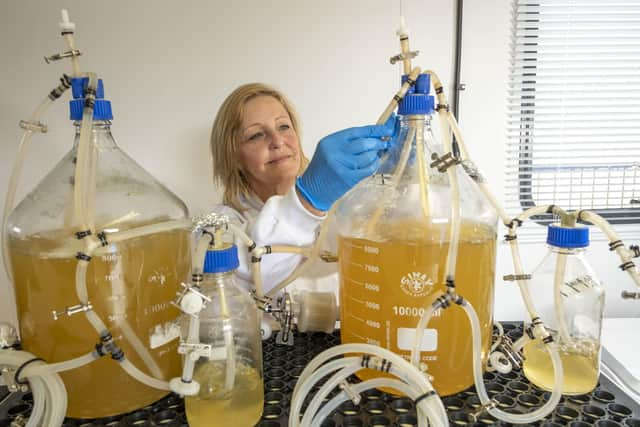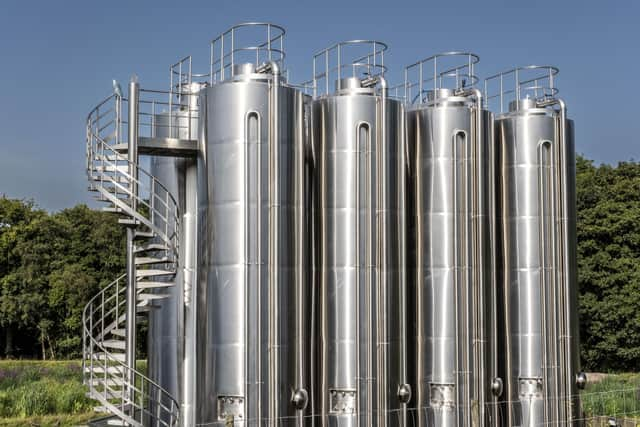Scottish biotech business MiAlgae turns whisky distillery waste into valuable omega-3 feed for fish and pets
More than 400 million litres of whisky are crafted in Scotland each year and drunk across the globe.
The bottles, laid end to end, could circle the earth more than 11 times over.
That’s a lot of our national spirit.
Advertisement
Hide AdAdvertisement
Hide AdBut it also leaves behind a large bulk of spent ingredients which are used to make the tipple but don’t end up in the glass, often going to waste.
This amounts to around three billion tonnes – made up largely of cereals – annually.
Now, though, a pioneering Scottish biotech firm is taking these byproducts and transforming them into something new – and valuable – a sustainable source of health-boosting omega-3.


It is also solving a waste disposal problem, tying into Scotland’s aims to achieve a circular economy, while also helping tackle climate change.
Omega-3 fats are beneficial for human health, and eating them can help to prevent heart attacks and strokes.
The compounds are also important for cats and dogs, helping keep bones and joints and immune systems healthy.
People are advised to eat oily fish like salmon and sardines as a way of absorbing the fatty acids.


But fish don’t actually make the oil themselves, rather they accumulate it through their diet – generally from eating algae.
Advertisement
Hide AdAdvertisement
Hide AdCurrently much of the world supply is produced by extracting the oil from wild-caught fish, putting pressure on stocks.
But Edinburgh-based start-up MiAlgae is making a supplement that can be used as a complete foodstuff for farmed fish or added to pet food, reducing reliance on the oceans and helping meet a shortfall in demand for the nutrients.
Scottish farmed salmon is the UK’s top food export, worth £581m a year to the economy.
So where does the whisky come in?
MiAlgae takes the plant-based leftovers from distilleries and uses it – deploying “revolutionary biology” – to grow microalgae which is rich in omega-3.
The algae – strictly speaking neither a plant nor an animal, but part of a group called protists – is then made into a special powder that can be fed straight to fish or used to fortify animal meals.
The company, headquartered at Currie on the outskirts of Edinburgh, has been able to scale up operations thanks to government funding, through Zero Waste Scotland, and private sector backing.
Its demonstrator site at Balfron, near Stirling, now has eight 30,000-litre tanks for growing the organisms, and the bosses have big plans for expansion to other areas where whisky is distilled locally – and much further beyond.
Julian Pietrzyk, head of technical transfer at MiAlgae, led the development and planning of the commercial demonstrator site in Balfron, which included design and procurement of the equipment and infrastructure.
Advertisement
Hide AdAdvertisement
Hide AdHe believes there are lots of ways businesses can bring in a circular economy structure to their processes.
“Opportunities are all around us,” he said.
“So many industries have surplus co-products that they are having to pay to get rid of, spray on land and ultimately impact the environment around us.
“You don’t have to look too far to find them, spot the openings and collaborate with like-minded businesses to tackle the environmental issues we’re all facing.
“We’re utilising co-products from different industries and implementing innovative biotechnology processes to create value products that protect the environment, and also create a vibrant circular economy that suppliers can benefit from.”
The ecological benefits have been sizeable, according to the company, which estimates that 18,000 tonnes of climate-warming carbon dioxide is kept out of the atmosphere each year through their current work.
This could grow to 100,000 tonnes per site annually if expanded to cover Scotland’s network of whisky distilleries.
Get the inside track on what’s happening in the world of Scottish politics with our daily newsletter
Mr Pietrzyk added: “We’re trying to expand and develop more sites, working closely with whisky distilleries to amplify our reach across Scotland.
“In the next six to 12 months we plan to progress two commercial sites live and producing.
“Technology licensing in the UK and further afield is next on our horizon and we’re proactively looking for opportunities oversees.”
Comments
Want to join the conversation? Please or to comment on this article.